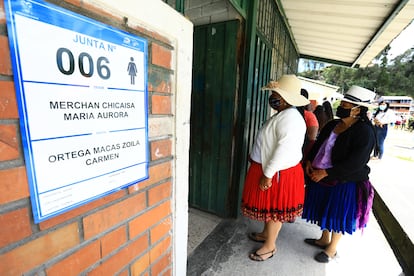A couple of indigenous women during the first round of the elections in Ecuador, on February 7, in Cuenca.Robert Puglla / (EPA) EFE
The vote of indigenous communities is a precious asset in Ecuador.
It represents between 7% and 10% of the national census and whoever manages to attract it for themselves will have the victory in the second round this Sunday.
Andrés Arauz, the candidate promoted by former President Rafael Correa, knows this;
And so does his rival, the conservative Guillermo Lasso.
Political logic says that Arauz should keep those votes, but divisions among the leaders of the indigenous movement and a long history of disagreements with Correa limit the support of the communities.
The political rift splits in two Ecuador
Rafael Correa, the absent politician who defines the election in Ecuador
Pachakutik is the name of the political arm that represents the Ecuadorian indigenous people.
In the 2006 elections, the movement analyzed the possibility of accompanying Correa with a candidate for vice president.
The idea did not mature and Pachakutik presented his own candidate, without much success: he added only 2.1% of the votes.
Correa, however, made a place for them in his cabinet and appointed a Quechua woman from Sarayaku as Secretary of Communication.
But the good harmony did not prosper.
The rupture matured little by little, as the indigenous bases raised their heads in rural areas to demand works, roads or to stop mining exploitation in their territories.
At the peak of the tension, the correista government equated the riots with terrorist acts and attempts to sabotage oil production, Ecuador's main source of foreign exchange.
There were then detainees, among them the last candidate for the presidency for Pachakutik, Yaku Pérez, and heavyweights of the indigenous leadership, such as Lourdes Tibán and Salvador Quishpe.
The wounds of that divorce are still open.
Today, the indigenous movement is divided against Arauz, at least from the leadership.
"The problem is different in the central highlands, in the Amazon or in the northern highlands, where the communities are engaged in commerce," says Jacobo García, an electoral political analyst.
“The error is in homogenizing.
You have part of the indigenous world that is favorable to Correa because he benefited from his public work and you have another indigenous world that rejects the correist development logic, based on the use of natural resources, ”he explains.
These divisions partly explain the complexity of the networks of support and rejection of the candidacies of Arauz and Lasso in the second round.
Pachakutik and his candidate Yaku Pérez, third in the first electoral round, have campaigned for the null vote.
The party is the political arm of the Conaie (Confederation of Indigenous Nationalities of Ecuador), whose leader, Jaime Vargas, nevertheless requested a vote for Arauz.
Yaku Pérez then called Vargas a "political corpse", while during the closing of the Arauz campaign, held on Thursday in Quito, Pachakutik flags waved.
The meeting of the correista candidate had a significant presence of indigenous leaders.
Among them was Nanky Sant, a Shuar from the Amazon who tried his luck as a candidate for deputy.
"Right now the only option that the peoples and nationalities have here in Ecuador is the option of progressivism represented by Andrés Arauz," says Nanky Sant.
The leader assures that the indigenous vote will go en masse towards Arauz, and that the call for a null vote of a sector of Pachakutik is evidence of their internal divisions.
"90% do not agree with the current Pachakutik leaders and with those who are resentfully promoting the null vote," he says.
Where will the indigenous vote go then?
"The null vote will not be significant, many voters will finally vote for someone," risks Sebastián Hurtado, president of the political risk consultancy Profitas.
“Behind the null vote promoted by Pérez and Conaie, at least a part of it, is the idea that Arauz and Lasso are equal, when they are not.
Arauz's policies are more aligned with the aspirations of the indigenous sectors, and those who end up voting for someone will opt for him.
In the indigenous sector there have been divisions about what to do with Arauz, but there has not been a vote towards Lasso, ”says Hurtado.
What can be seen on the surface is the disconnection between "the leadership and the rank and file, which is more to the left and therefore close to Arauz," he explains.
On Monday, however, the Pachakutik will have a lot to say to the Government that emerges from the polls.
The result of Yaku Pérez in the first round (19.39%, less than 33,000 votes from Lazzo), made the political arm of the indigenous communities the second force in the Assembly, with 27 legislators in the Assembly.
"It is the greatest representation in its history", highlights Pedro Donoso, director of the consulting firm Icare.
“They don't play shortstop, they see a future strategy to dispute governance.
That is why Pachakutik has said that he will oppose whatever government it is, even in a programmatic alliance with Javier Erbas's Democratic Left, which came out fourth in the first round and will have 18 legislators, ”he explains.
If Arauz finally wins, part of the rank and file may demand pacts with Correísmo, but it will be the political game of the leaderships that will define the relationship with the new government.
Without clear majorities in the Assembly that will take office in May, indigenous legislators know that they will have the key to governance.
Subscribe here
to the
EL PAÍS América
newsletter
and receive all the informative keys of the current situation in the region.

